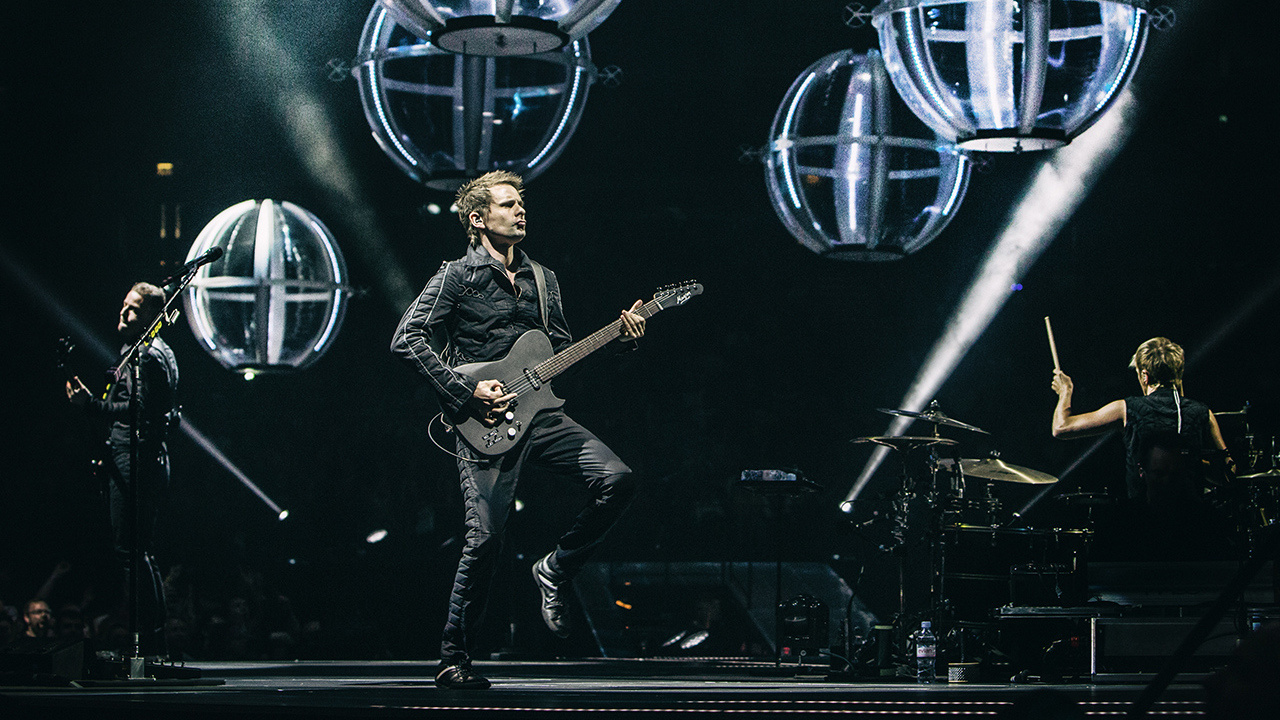If the April sky is grey and the thunder above London is loud as we enter the arena, it prepares us nicely for Muse’s cloudbusting sellout gig at the capital’s megadome, where according to Twitter it is the venue’s biggest concert ever, with 21,000 present. Not to mention conceivably its most visually arresting.
The show you are about to enjoy involves video projection of a spectacular kind,” the announcer warns, underselling things somewhat as transparent space-pods circle above our heads like something out of Close Encounters Of The Third Kind and the choral, hymnal Drones (the closer to the 2015 album of the same name) plays like music of the spheres.
The band perform for the first time ‘in the round’, from the middle of the arena, allowing fans on all sides to see their favourite prog-pomp rockers. Muse are arguably Britain’s biggest underground stadium band - they can fill out supermassive black holes like the O2 while enjoying a degree of anonymity. That anonymity sometimes makes Messrs Bellamy, Wolstenholme and Howard seem characterless, but then you could probably have said the same thing in 1976 about Pink Floyd. And like the Floyd they let the music - and the visuals - do the talking. They may not dominate critical discourse in the way, say, Radiohead do, but they are the People’s Choice when it comes to sci-fi sturm und drang with a penchant for political message-mongering and conspiracy theories.
Besides, with riffs like Psycho, who needs personality? They make a huge noise for a trio, and include enough prog curlicues and metal power to satisfy at least two demographics. Reapers is like Queen sucked dry of all camp, the focus all on the surgical precision with which the three players dispatch their instrumental parts. There is something clinical about Muse, but the audience appreciate the seriousness with which they take themselves: each song so far has been met with the sort of rapture normally reserved for finales. Chris Wolstenholme’s bass fretboard lights up as giant screens suspended from the ceiling display cyborgs and attendant technology. It’s an immersive experience, the visuals providing stimuli when the appeal of Bellamy and co, miniature meninblack on a stage far away, starts to fade.
Muse pluck from virtually all corners of their own musical universe, from 2001’s Bliss to Starlight, Supermassive, Map Of The Problematique and Take A Bow, all from 2006’s Black Holes And Revelations. And if some of the songs explore a similar dynamic range, there is always a startling visual to sustain the attention. They make obvious connections between Cold Wars past and present during JFK while The Globalist suggests Muse could manage a shlock-on-steroids Bond theme if they wanted.
There is an eruption of noise and burst of confetti for the climactic Mercy before Knights Of Cydonia brings proceedings to a close. But it’s Uprising, as ever, that remains the epic highlight, as well as the ironic centrepiece, as thousands of revellers are subsumed into a heaving, frenzied mass and willingly submit to
a dystopian future-anthem about the menacing power of control. Bellamy could have been singing about his band earlier on in Time Is Running Out: ‘Something beautiful/A contradiction.’ The joy of Muse is that you don’t have to worry about such inconsistencies.

